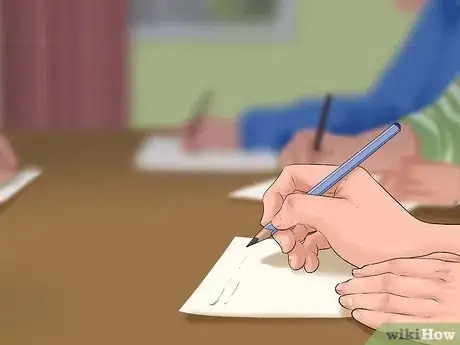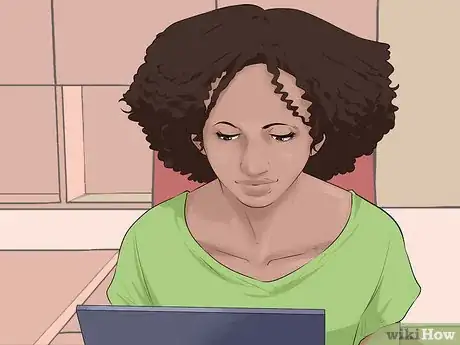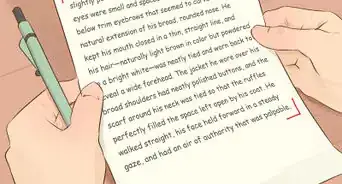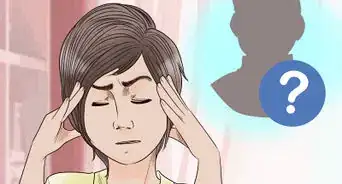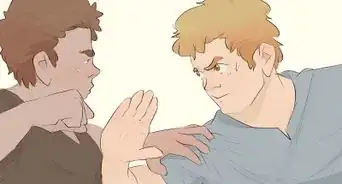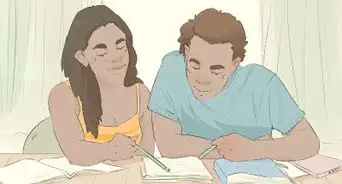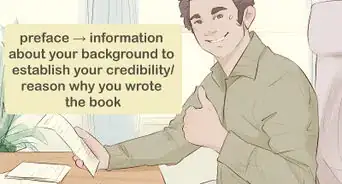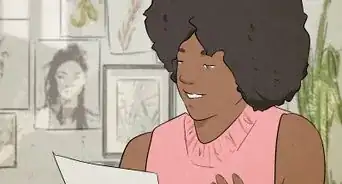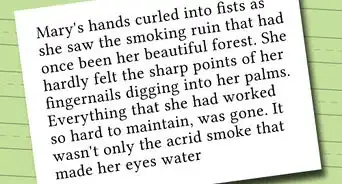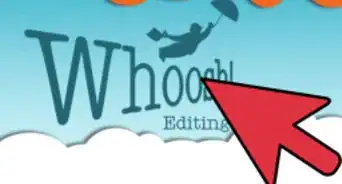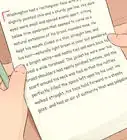This article was co-authored by Melessa Sargent. Melessa Sargent is the President of Scriptwriters Network, a non-profit organization that brings in entertainment professionals to teach the art and business of script writing for TV, features and new media. The Network serves its members by providing educational programming, developing access and opportunity through alliances with industry professionals, and furthering the cause and quality of writing in the entertainment industry. Under Melessa's leadership, SWN has won numbers awards including the Los Angeles Award from 2014 through 2021, and the Innovation & Excellence award in 2020.
There are 7 references cited in this article, which can be found at the bottom of the page.
This article has been viewed 50,094 times.
Creative writing is any form of writing intended for entertainment, although it may also inform or persuade. It encompasses fiction, poetry, song lyrics, scripts, biographies, and anything that combines these elements. Although creative writing is an innate skill, it can be taught, and its techniques must be learned in order to develop as a writer. There are a number of ways to learn creative writing; the steps below cover some of these ways.
Steps
-
1Decide what form of creative writing interests you most. You may have interests in several forms of writing; however, it's usually best to start with one form or a few similar forms before branching out into other areas.
- To determine where to start, consider what interests you most. If you enjoy a particular genre of fiction, such as science fiction, and imagine how you would write the story differently, you may want to begin by learning to write in that genre. If you find yourself paying particular attention to the choice of words in your favorite songs, you may want to learn how to write song lyrics.
- You may also wish to tackle a smaller project within the form of writing that interests you most, such as a short story or novella instead of an epic trilogy, or a few good songs instead of a concept album, for example.
-
2Take creative writing classes. Creative writing classes are available in a number of venues:
- College campuses. Many colleges and universities offer the opportunity to major or minor in creative writing as part of a fine arts degree, or as an elective class for credits to count toward a degree in something else. These classes are usually taught by tenured or adjunct professors, with classes lasting an entire semester.
- Community colleges. Many community colleges offer a variety of non-credit, continuing education classes for those who want to learn new things. Writing classes are often among their most popular offerings. Some community college writing classes may last a full semester, while others run only a few weeks. These classes may be taught by professors at the college or by experienced writers in the community.
- Seminars. These are short, one- or two-day classes that may be held at a community center, a civic organization, a writer's retreat, or at a convention devoted to a particular genre. These classes are usually taught by experienced writers.
- Online. Online creative writing classes may be offered by four-year or community colleges as an outreach program or by organizations geared solely to teaching writing online. Some classes may be offered for free, while others have charges ranging from nominal to substantial.
Advertisement -
3Read books on creative writing. Books on creative writing cover a number of aspects:
- General how-to books teach the basics of creative writing. These books may include techniques on how to stimulate your creativity, provide suggestions on how to structure your writing time, or offer advice on dealing with agents and publishers.
- Technique-specific how-to books teach particular writing methods that can be applied across a number of writing genres. Dwight Swain's "Techniques of the Selling Writer," for example, teaches how to structure stories to build tension.
- Genre-specific how-to books teach how to write in a specific genre, such as mysteries, science fiction, or romance.
- Genre-specific reference books provide information that writers need to know to create realistic settings for their stories in that genre. There are books covering life in the Middle Ages for historical fiction and fantasy writers, books on forensics for mystery writers, and books of age-appropriate words for children's book writers.
-
4Attend writing workshops. Writing workshops provide you the opportunity to share your work with and have it reviewed by fellow writers, and to learn how other writers develop their works. Writing workshops may be part of college writing courses, continuing education classes, or part of writers' conferences or conventions.[1]
- Most writing workshops will require you to have a piece of writing to share with the other writers attending the workshop.
-
5Follow writing blogs and podcasts. A number of authors set forth their opinions on writing in the form of either a weblog or podcast. You can find authors who write in the area you are interested in and either bookmark their blogs or download their podcasts to review at your leisure.
-
6Join a writers' group. Writers' groups provide the chance to network with other writers to share both techniques and opportunities to market your work. Large writing groups may share writing techniques through the group newsletter, while small groups may be organized as critique groups, which function similarly to writing workshops. Some groups meet physically, while others connect online through forums or Yahoo groups.[2]
- You can find writers' groups in your area by using an Internet search engine or through Meetup.com.
-
7Practice. No matter what formal or informal methods you choose to learn creative writing, the surest way to improve your writing skills is to write regularly and often, applying what you've learned from the methods listed above.[3]
- If you write fiction, one way to practice is to take part in National Novel Writing Month (NaNoWiMo), held informally during the month of November. The goal is to start and finish a writing a novel during those 30 days.
Expert Q&A
-
QuestionWhat do I need to write a script?
 Melessa SargentMelessa Sargent is the President of Scriptwriters Network, a non-profit organization that brings in entertainment professionals to teach the art and business of script writing for TV, features and new media. The Network serves its members by providing educational programming, developing access and opportunity through alliances with industry professionals, and furthering the cause and quality of writing in the entertainment industry. Under Melessa's leadership, SWN has won numbers awards including the Los Angeles Award from 2014 through 2021, and the Innovation & Excellence award in 2020.
Melessa SargentMelessa Sargent is the President of Scriptwriters Network, a non-profit organization that brings in entertainment professionals to teach the art and business of script writing for TV, features and new media. The Network serves its members by providing educational programming, developing access and opportunity through alliances with industry professionals, and furthering the cause and quality of writing in the entertainment industry. Under Melessa's leadership, SWN has won numbers awards including the Los Angeles Award from 2014 through 2021, and the Innovation & Excellence award in 2020.
Professional Writer You really only need a good writing software program and some creative juices. There are free programs out there and there some solid options that cost money, but they're all different so you should do some research to see which one works best for you.
You really only need a good writing software program and some creative juices. There are free programs out there and there some solid options that cost money, but they're all different so you should do some research to see which one works best for you. -
QuestionHow do I craft an outline for a story?
 Melessa SargentMelessa Sargent is the President of Scriptwriters Network, a non-profit organization that brings in entertainment professionals to teach the art and business of script writing for TV, features and new media. The Network serves its members by providing educational programming, developing access and opportunity through alliances with industry professionals, and furthering the cause and quality of writing in the entertainment industry. Under Melessa's leadership, SWN has won numbers awards including the Los Angeles Award from 2014 through 2021, and the Innovation & Excellence award in 2020.
Melessa SargentMelessa Sargent is the President of Scriptwriters Network, a non-profit organization that brings in entertainment professionals to teach the art and business of script writing for TV, features and new media. The Network serves its members by providing educational programming, developing access and opportunity through alliances with industry professionals, and furthering the cause and quality of writing in the entertainment industry. Under Melessa's leadership, SWN has won numbers awards including the Los Angeles Award from 2014 through 2021, and the Innovation & Excellence award in 2020.
Professional Writer Take your idea or story and jot down the key points. Then, try to map out the organization in a way that makes sense to you based on the information or details you want to communicate at certain points in your outline.
Take your idea or story and jot down the key points. Then, try to map out the organization in a way that makes sense to you based on the information or details you want to communicate at certain points in your outline. -
QuestionIs there a way to get help paying for these classes?
 Tom De BackerTop AnswererYou can ask your (future) publisher to give you an advance. Look into any social benefits or creative grants your country offers when learning things that will generate income later. Ask the school if you can get a payment plan. Ask your boss for an advance on your salary. Save a small bit of your salary every month until you have at least part of the tuition fee. Give up smoking and save that money, or anything else that is less important to you than these classes.
Tom De BackerTop AnswererYou can ask your (future) publisher to give you an advance. Look into any social benefits or creative grants your country offers when learning things that will generate income later. Ask the school if you can get a payment plan. Ask your boss for an advance on your salary. Save a small bit of your salary every month until you have at least part of the tuition fee. Give up smoking and save that money, or anything else that is less important to you than these classes.
Warnings
- Be aware that some online writing programs are not on the up-and-up. This is usually not a problem with programs affiliated with a recognized institution of higher education but may be with a private organization. If you're not familiar with the organization behind a writing program, take the time to investigate that organization before committing your time and money.⧼thumbs_response⧽
References
- ↑ Melessa Sargent. Professional Writer. Expert Interview. 14 August 2019.
- ↑ Melessa Sargent. Professional Writer. Expert Interview. 14 August 2019.
- ↑ Melessa Sargent. Professional Writer. Expert Interview. 14 August 2019.
- http://www.dailywritingtips.com/creative-writing-101/
- http://www.guardian.co.uk/books/2013/jan/18/what-creative-writing-course-taught-me
- http://www.writersbureau.com/
- http://learn.utoronto.ca/courses-programs/creative-writing
- http://www.ed.ac.uk/studying/postgraduate/degrees?id=770&cw_xml=details.php
- Rodney Ruff, Omaha, NE; experienced writer and editor

